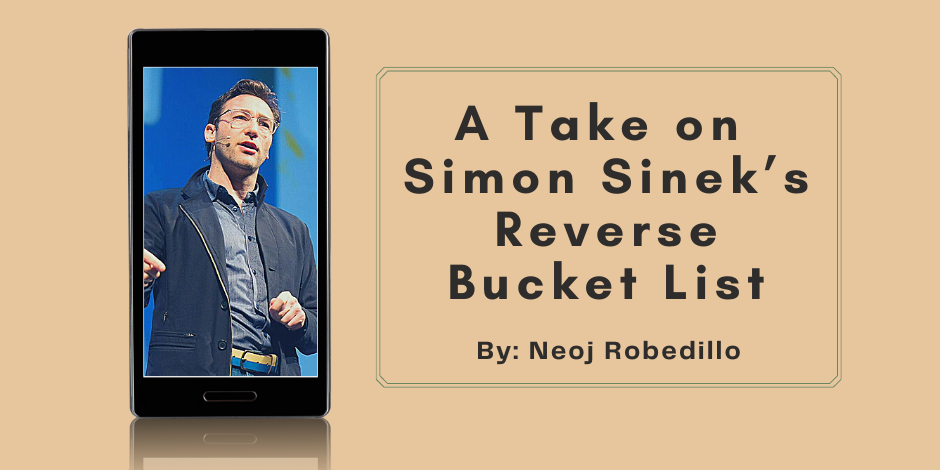As someone who recently graduated from university and started earning his own money, I had the idea of updating my personal bucket list. Finishing my degree and having my first job are some of the milestones that I was able to tick off from the list this year. However, as I look at my bucket list, I saw how far I still am from achieving the things that I have listed. I realized that my progress in life is slow. This was the thought that was constantly running through my head until I came across Simon Sinek’s video clip on Reverse Bucket List.
The dictionary meaning of a bucket list is “a number of experiences and achievements that a person hopes to have or accomplish during their lifetime.” According to Sinek, “What a bucket list does is create a long list of things that we haven’t done, and it reminds us of all the things we are missing.” He also emphasized how bucket list neglects gratitude, especially on milestones that are difficult to achieve but were obtained nevertheless. A reverse bucket list, on the other hand, allows people to “go through the things that [they] would be able to do and [they were] able to do.” Sinek explained that he would rather look at the things that he was able to accomplish and be thankful that he has lived a rich life. “It’s a nicer feeling to know the things that I have done,” he added.
Looking at it, both conventional and reverse bucket lists have their pros and cons. The conventional way of writing a bucket list elicits hopefulness and motivation for people to achieve their identified goals. When we write our bucket list, there is this sense of hope that we are going to accomplish these goals and tick them off the list. Dizon (2022) stated that the traditional bucket list “serves as a motivation to work harder.” However, she also added that it can be overwhelming especially when the progress in achieving these goals is slow and sometimes long drawn out that we might lose the motivation to pursue them further. Nonetheless, the typical bucket list allows us not to lose sight of what we want to do, what we want to accomplish, where we want to be, and what we want to become.
On the flip side, the reverse bucket list, as emphasized by Sinek in his video, enables us to practice gratitude. It is a constant reminder of our achievements and progress in attaining our goals. Meyer-Shine (2017) cited that productivity enthusiasts call the reverse bucket list a “done list” since the primary motive of creating such is to enlist all our accomplishments, see how far we have come, be thankful about it, and “gain a major sense of fulfillment” towards it. It’s a switch from a “to-do” list to a “ta-dah!” list. But unlike the normal way of writing a bucket list, the done list might be lacking in the motivation aspect since a person who lists down their accomplishments might not be challenged anymore, become complacent, and not be motivated to move forward. In spite of that, Meyer-Shine (2017) sees the reverse bucket list as a “nostalgia playlist” – a collection of our greatest hits and memories.
Nevertheless, everything still boils down to how we would perceive and use the two to accomplish our goals. Both are great reminders of where we are now and where we can be. On a personal note, I am inclined in writing both: the reverse bucket list – where I can be constantly reminded of the things that I have accomplished; and the normal bucket list – where I can be motivated and challenged to conquer greater heights.
Here is Simon Sinek’s video clip on Reverse Bucket List during Reality One – One Summit last April 2022.
References:
Dizon, A. (2022). Inspirational Speaker Simon Sinek Believes in ‘Reverse Bucket List’. The Manila Journal. https://themanilajournal.com/2022/07/19/inspirational-speaker-simon-sinek-believes-in-reverse-bucket-lists/
Meyer-Shine, A. (2017). How making a ‘reverse-bucket list’ can make you happier. Fast Company. https://www.fastcompany.com/40497651/how-making-a-reverse-bucket-list-can-make-you-happier#:~:text=The%20reverse%20bucket%20list%20is,and%20it’s%20an%20encouraging%20exercise.
By: Neoj Robedillo
Neoj Robedillo is a budding professional in the field of Talent and Development. Earning his degree in Applied Psychology as Magna Cum Laude from the University of the Philippines Diliman, Neoj aspires to become a credible Training Facilitator and a practitioner involved in people and organizational culture.









